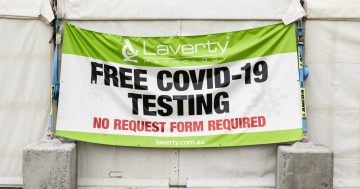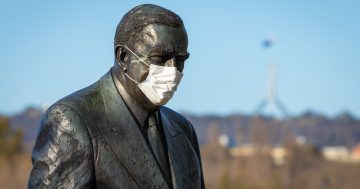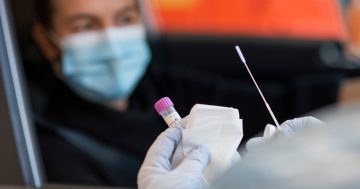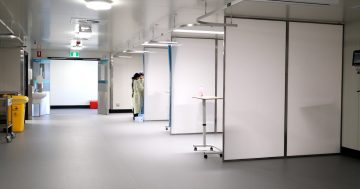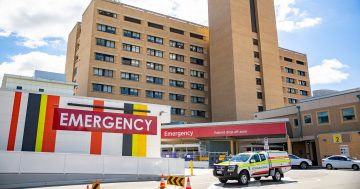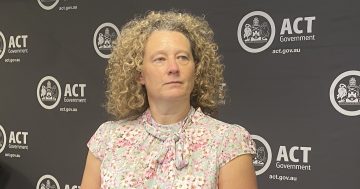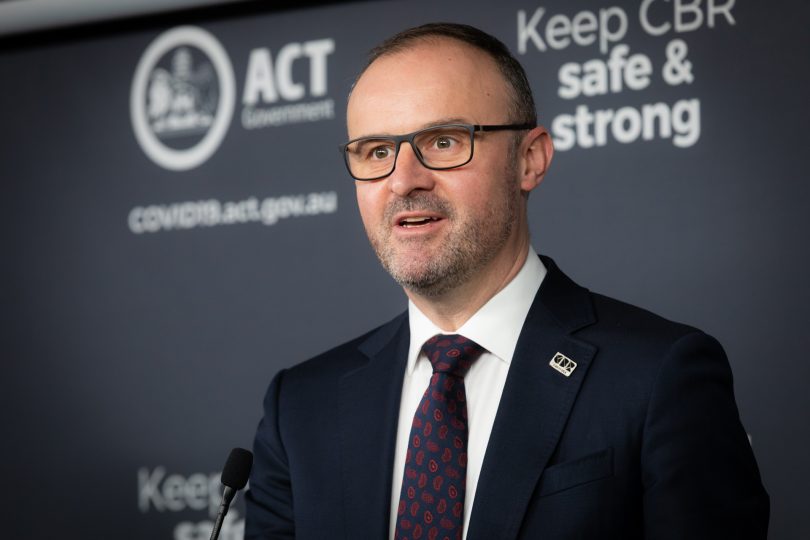
Final plans for schools are being finalised after National Cabinet failed to reach consensus on a return to school. Photo: Michelle Kroll.
UPDATED 4 pm: National Cabinet met this afternoon with a full agenda that included a COVID-safe return to school and a plan to allow 16-year-olds to drive forklifts.
The latter was resolved in the negative while the former has been firmly left in the hands of states and territories – including the issue of the use and procurement of rapid antigen testing.
Although the Prime Minister said the states and territories agreed that schools should remain open once they commence term one 2022, the group has seemingly failed to reach a consensus on all other matters relating to schooling.
“If schools don’t stay open, you could see that furloughing of our workforce go from 10 to 15 per cent, which would have a devastating effect on our economy,” Mr Morrison said.
“Return-to-school plans will be announced individually by each jurisdiction over the next few days.”
According to a statement released by ACT Chief Minister Andrew Barr following the meeting, the government continues to plan for students to return to on-campus learning as soon as term one begins.
“Arrangements similar to those at the end of last term” will be in place, the statement read.
“Our schools will always prioritise the safety of students and staff while continuing to provide the best possible education to our children and young people.”
Full details will be provided once plans have been finalised.
Still up in the air is how outbreaks will be managed in schools, and who exactly will have to isolate, and for how long, if and when positive cases attend school campuses.
Mr Morrison said states and territories would have to source and supply rapid antigen tests themselves if they decide to use them in schools.
However, if the states and territories put testing systems in place, they would receive federal financial support through the national partnership.
“Where surveillance testing is elected to be done by a state or territory, including for early childhood education and childcare centres, the … federal government will be supporting that 50-50 through the national partnership agreement with those states and territories and that will be done on an individual jurisdiction basis,” Mr Morrison said.
The country’s Chief Medical Officer Paul Kelly said transmission of the virus would likely increase when school goes back but that it’s important children do go back to school for “all sorts of reasons”.
Further, he said a child should not be considered a close contact if there is another positive COVID-19 case in the classroom.
At today’s meeting, all states and territories unanimously rejected a proposal from the Prime Minister which would have allowed 16-year-olds to drive a forklift.
“The ACT Government continues to work closely with employers, industrial representatives and the NGO sector to ensure that workplaces remain safe, with further guidance to be made available in the coming days,” the Chief Minister’s statement read.
Speaking at a press conference earlier today, Mr Morrison said although discussions had taken place, the decision had ultimately been taken not to broaden the “essential workers” category any further to include groups such as hospitality.
He described it as a “balancing act” between keeping as many people at work as possible and supply chains rolling along while still reducing the number of COVID-positive people infectious in the community.
National Cabinet will meet next Thursday (27 January).
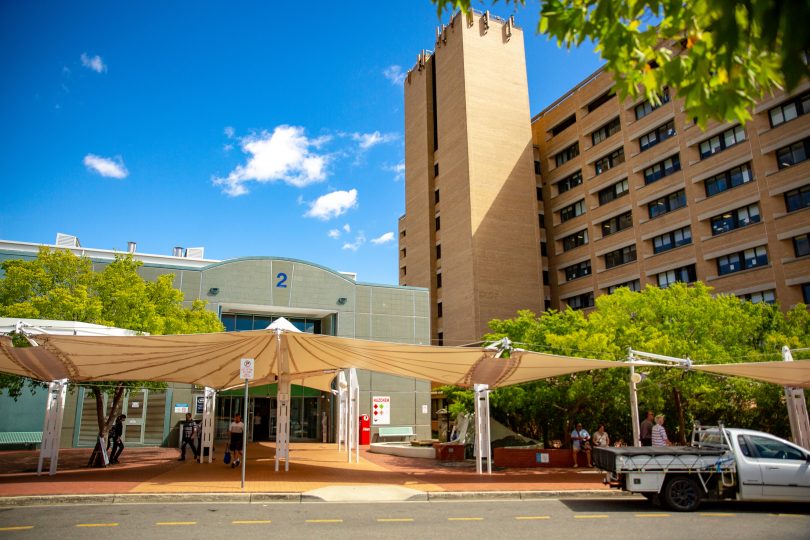
Canberra Health Services staff are now required to self-administer a PCR test every two days – likely because of a shortage of rapid antigen tests. Photo: George Tsotsos.
12 pm: The number of new COVID-19 cases in the ACT has fallen to 892 – from 1467 yesterday – with most new cases coming from rapid antigen test results.
There are now 62 people in hospital, including three in intensive care and two requiring ventilation, compared with 60 reported yesterday, including five in ICU and two being ventilated.
However, current hospital numbers include patients who have tested positive after being admitted to hospital and are being treated for a completely different reason.
The latest case numbers come from 254 positive PCR results and 638 rapid antigen tests, taking the number of active cases in the ACT to 4447 (392 PCR and 4055 RAT).
All five of the ACT’s testing stations are open today: Garran (open 7:30 am to 9 pm), Mitchell (open 8 am to 10 pm), Nicholls (open 8 am to 4 pm), Holt (open 8 am to 4 pm) and Kambah (8 am to 4 pm) where RAT kits are available for eligible people (one test per person).
ACT Health has re-issued a call for “members of the public to be kind and respectful to staff, including traffic controllers when they present at testing sites”.
“Aggression towards the team will not be tolerated,” a post on ACT Health’s Facebook page read.
The ACT’s 12-plus vaccination rate remains constant at 98.6 per cent.
Over a third of those aged 18 and over have now received a booster shot (34.7 per cent), while 37.9 per cent of the population aged five to 11 have received one dose.
Meanwhile, Canberra Health Services’ staff must self-administer a PCR test every two days.
Results for the tests done by staff members generally come back in around eight hours – longer than the 15-minute rapid antigen test result – and staff members have reported the experience not being a particularly pleasant one.
Originally, the plan had been to use rapid antigen tests, but staff members understand this had to change due to a shortage of rapid antigen tests (RATs).
Canberra Hospital is currently experiencing a shortage of junior medical officers, according to an email sent to all staff earlier this week and seen by Region Media.
Multiple COVID-19 exposures at the hospital and in the community are taking their toll on the health workforce.
As of 4 pm yesterday, 538 health care workers were furloughed across the ACT.
The national medical regulator – the Therapeutic Goods Administration (TGA) – has now granted provisional approval to the first two oral treatments for COVID-19.
Deliveries of Pfizer’s Paxlovid and Lagevrio, made by pharmaceutical company Merck Sharp and Dohme, will begin to arrive in the country in the coming weeks.
The Federal Government has secured 500,000 courses of Paxlovid and 300,000 courses of Lagevrio.
Federal Health Minister Greg Hunt said the treatments effectively treat people with mild to moderate COVID-19 who have a high risk of progressing to severe disease, reducing admissions to hospital and ICU and potential death.
Both treatments have already been approved for use by the US and UK health authorities.
The TGA has also given the protein-based Novavax vaccine provisional approval for use in Australia.
ATAGI must still approve it before it can be rolled out but the Federal Government has already ordered 51 million doses.
Interstate, NSW has recorded a slight drop – to 25 – in the number of COVID-19 deaths reported overnight.
The previous two days had been two of the deadliest for the state since the pandemic began.
A total of 30,825 new cases were reported (13,178 RATs, 17,647 PCR).
Hospital numbers have also dropped to 2781 from 2863 the previous day. There are 212 people in ICUs around the state.
NSW Health says nearly 30 per cent of the state’s eligible population has received a booster dose, and 93.8 per cent of the 16-plus population has received two shots.
In Victoria, 21,966 (10, 273 RATs and 11,693 PCR) new cases have been reported as well as 15 deaths.
There are 1206 people hospitalised with the virus, and 93 per cent of the state’s 12-plus population is now fully vaccinated.
In Victoria, 27 per cent of the state’s population has received a booster dose.
National Cabinet will meet again today with the reopening plan for schools on its agenda.
NSW Premier Dominic Perrottet has repeatedly said students in the state will return to school as planned. Queensland and South Australia have both delayed the start of term somehow.
An announcement from the ACT Education Directorate is expected after National Cabinet meets, either today or tomorrow.
More to come.












